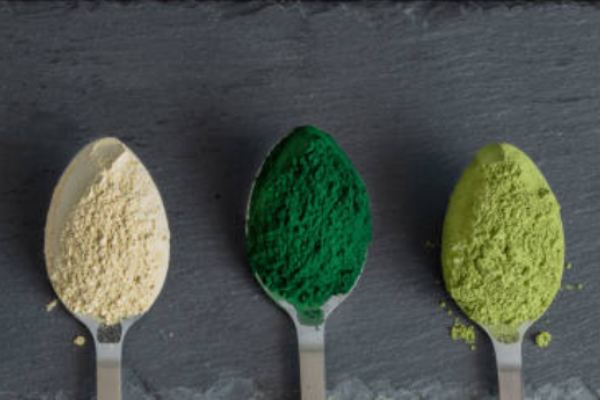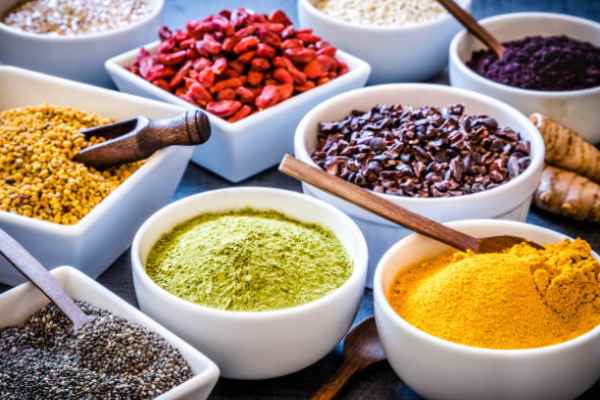Avoiding animal products doesn’t have to mean you’re short of protein.
Whether you’re on the move or trying to refuel quickly after a workout, you can choose from a variety of plant-based protein powders—plain or flavored—to mix with water, low-fat milk, smoothies, oatmeal or other foods.
Find out below what are the best plant proteins that can help you if you are vegan or vegetarian.
How is plant protein powder obtained?
Plant-based foods like rice, peas and sunflower seeds aren’t packed with proteins like meat and fish, but food processors can remove most of the fats and carbohydrates and isolate the proteins found in those foods to make a protein-rich powder.
Despite some claims, most plant proteins are not complete, meaning they do not contain optimal levels of all essential amino acids to support protein synthesis in your body.
However, this is not a problem if you regularly eat a variety of vegetable proteins.
The best vegetable proteins if you don’t eat meat
Here are the 9 best vegan protein powders and their nutritional ingredients.
1. Pea protein
Pea protein is not made from sweet green peas, but from their relatives with more protein, yellow peas.
Serving a quarter cup (28 grams) of unsweetened pea protein packs about 21 grams of protein and 100 calories, depending on the brand. As with other legumes, it contains little of the essential amino acid methionine.
However, pea protein is particularly rich in essential branched chain amino acids (BCAAs), leucine, isoleucine and valine, which help muscle work and stimulate your body to make muscle proteins.
In addition, the muscle mass you get from pea protein is similar to those that consume whey protein (milk).
Studies also suggest that pea protein may trigger feelings of fullness and lower blood pressure.
2. Hemp proteins
Hemp protein comes from the seeds of the cannabis plant, but from different species grown to contain only traces of the euphoric compound tetrahydrocannabinol.
Serving a quarter cup (28-gram) of unsweetened hemp protein powder contains about 12 grams of protein and 108 calories, depending on the brand. It is also an excellent source of fiber, iron, zinc, magnesium and alpha-linolenic acid (ALA), the plant form of omega-3 fat.
As hemp contains little lysine essential amino acids, it is not a complete protein. However, if you routinely eat legumes or quinoa, you can fill that gap.
Research suggests that hemp seed protein may be a valuable source of compounds to lower blood pressure.
3. Proteins from pumpkin seeds
In their entire form, pumpkin seeds have a relatively large amount of protein and healthy fats. When produced into powder, most of the fat is removed, which reduces calories.
Serving pumpkin seed protein powder (28 grams) provides about 103 calories and 18 grams of protein, depending on the brand. As it contains few essential amino acids threonine and lysine, it is not a complete protein.
Nevertheless, pumpkin seed protein is very nutritious, supplying large amounts of magnesium, zinc, iron and other minerals, as well as useful plant compounds.
Several studies have been conducted on the health benefits of pumpkin seed protein, but there is evidence that it may have antioxidant and anti-inflammatory properties.
4. Proteins from brown rice
Brown rice protein is easy to find and relatively inexpensive.
A quarter cup (28 grams) of unflavoured brown rice protein contains about 107 calories and 22 grams of protein, depending on the brand. It contains little lysine of essential amino acids, but it is a good source of BCAAs that supports muscle building.
In fact, a preliminary study suggests that brown rice powder protein may be as good as whey protein in supporting muscle growth when consumed after weight training.
One of the problems with rice products is the possibility of contamination with arsenic and heavy metals. Choose a brand of rice protein powder that tests arsenic levels.
5. Soy protein
Soy protein powder is a complete protein, which is not uncommon for plant protein. It is also high in BCAAs to support strength and muscle growth.
Serving isolating soy protein powder in a quarter cup (28 grams) contains about 95 calories and 22 grams of protein, depending on the brand. In addition, it contains useful biit contains compounds, including those that can lower your cholesterol.
Soy protein has not been a favorite in recent years, in part because most soybeans in the U.S. are genetically modified (GM). However, there are several brands of non-GM soy powder that you can buy.
Other reasons why soy protein isn’t as popular include soy allergy and concerns about potential negative health impacts, like breast cancer risk.
However, it has recently been observed that soy protein isolate contains plant compounds that have anticancer activity, including breast cancer.
This review also found that some previous soybean safety concerns were based on animal testing results that do not necessarily apply to humans.
Accordingly, it is wise to use a variety of vegetable protein powder, and not rely on just one type.
6. Sunflower Seed Protein
Protein isolated from sunflower seeds is a relatively new vegan protein powder option.
Serving sunflower seed protein powder in a quarter cup (28 grams) contains about 91 calories, 13 grams of protein, depending on the brand, and provides BCAAs for muscle building.
Like other seeds, it contains little of the essential amino acid lysine. However, it is a good source of all other essential amino acids. To improve lysine levels, sunflower seed protein is sometimes combined with quinoa protein powder, which is a complete protein.
So far, there are no studies comparing the health effects of sunflower seed protein with other isolated sources of plant protein in animals or humans.
7. Sacha Inchi protein
This protein comes from star seeds of sacha inchi (sometimes called walnuts), which are grown in Peru. Due to the relatively limited supply, it costs more than conventional proteins.
A serving of sacha inchy protein powder from a quarter cup (28 grams) contains about 120 calories and 17 grams of protein, depending on the brand. It is a good source of all essential amino acids except lysine.
In addition, sacha inchi protein is a particularly good source of the essential amino acid arginine that your body uses to obtain nitric oxide. Nitric oxide drives your arteries to expand, improving blood flow and lowering blood pressure.
This unique vegan protein also delivers ALA omega-3 fats that support heart health.
8. Chia protein
Chia seeds come from Salvia hispanica, a plant originating in South America. They have become a popular dietary supplement, for example, as part of smoothies, porridges and rolls, but they can also be converted into chia protein powder.
Serving chia protein powder in a quarter cup (28 grams) contains about 50 calories and 10 grams of protein, depending on the brand. As with other proteins with semen, it contains little of the essential amino acid lysine.
Chia powdery form can improve its digestibility. In some studies, the digestibility of raw chia seeds was only 29% compared to 80% for chia powder. This means that your body can absorb more of its amino acids.
In addition to protein, chia powder contains 8 grams of fiber per serving, as well as large amounts of some vitamins and minerals, including biotin and chromium.

9. Plant protein blends
Different plant protein powders are sometimes combined and sold as blends. They often have added flavors and sweeteners.
One of the benefits of mixing plant proteins is that they can ensure optimal levels of all essential amino acids in a single product.
For example, pea protein can be combined with rice protein. Pea protein supplies lysine, in which rice protein is low, while rice protein delivers methionine, which pea protein does not contain.
Quinoa protein is usually used in combination with other plant proteins. It is one of the few complete vegetable proteins.
Other trends you’ll see in mixed vegetable protein powder are the addition of enzymes to help digest the product, as well as the use of germinated or fermented plant proteins.
Germination and fermentation can increase the amounts of useful plant compounds, vitamins and minerals. It can also help break down antinutrients that can interfere with the absorption of amino acids, minerals and other nutrients.
Vegetable protein as a supplement to the pehrani
Vegan protein powders can supply your body with the essential amino acids it needs to support protein synthesis in your body, including those needed to rebuild and grow muscles.
Cereals, legumes and seeds are a typical source of plant protein powder that is formed by removing most fats and carbohydrates while isolating protein components.
Common vegan protein powders are peas, hemp, brown rice and soybeans. Protein powders from seeds, including pumpkin, sunflower, chia and sacha inchi, are becoming increasingly available.
In addition to soy beans and quinoa, vegetable proteins usually contain fewer or fewer essential amino acids. This is not a problem if you regularly eat a variety of plant foods or buy a powder that contains a mixture of complementary proteins.
Keep in mind that nutrition data varies by brand, so be sure to check the labels on the packaging.